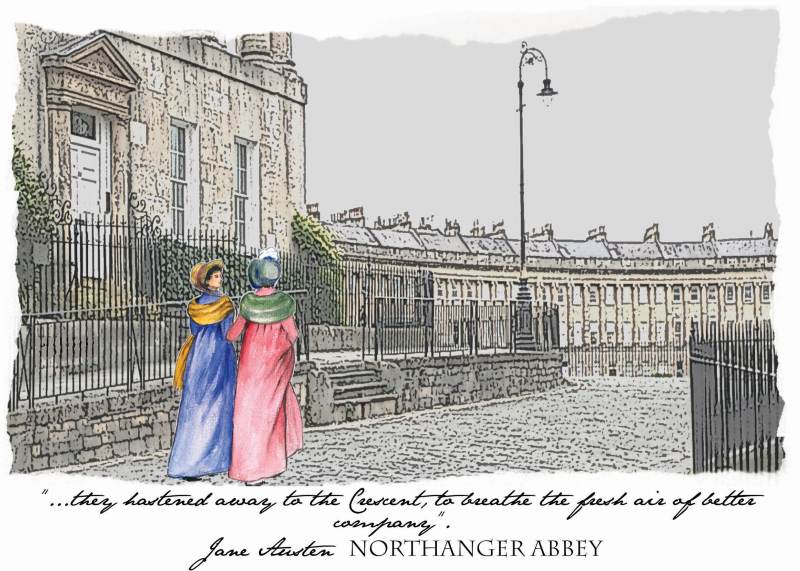Jane Austen News - January 2018
What's the Jane Austen News this week? Costume Dramas!

We love costumes dramas. Some of our favourite recent viewings have been the hit costume dramas shown over Christmas. We had the sumptuous The Miniaturist, we had a new three-part adaptation of Little Women, and we've had a Call The Midwife Christmas special. Over the past few years we've had Downton Abbey, The Crown, Lark Rise to Candleford, Cranford, War and Peace... We could go on. However, while we've very much enjoyed these, in an interview about being based in Britain, actress Thandie Newton has highlighted a problem about having a dominance of costume dramas in the British entertainment industry.

I can’t work, because I can’t do Downton Abbey, can’t be in Victoria, can’t be in Call The Midwife … there just seems to be a desire for stuff about the royal family, stuff from the past, which is understandable, but it just makes it slim pickings for people of colour.

Part of the problem is that if every costume drama is adapted from a book which only features upper-class white characters, then that’s all there will be on TV. Historical accuracy is one thing, but should it come at the cost of diversity within the acting world? Some within the television and film industry are calling for script writers to write scripts which allow for a more diverse range of actors to be represented within the cast. Afterall, if Maxine Peake can play the male role of Hamlet at the National Theatre, why can't an actor like Idris Alba play Colonel Brandon? What are your thoughts?
Talking of costume dramas... As Joe Wright sees his new film, Our Darkest Hour, released in UK cinemas to rave reviews from the critics, he has been looking back at his previous films and comparing his most recent filming directorial role to the experiences he had when filming his earlier movies. This includes Atonement, and the 2005 adaptation of Pride and Prejudice, which saw Keira Knightley and Matthew Macfadyen in the lead roles and the first feature film for which Wright was the director.
Pride & Prejudice feels like a long time ago. I remember my producer at the time, Paul Webster, saying to me that only one in 10 first time filmmakers makes another film and that terrifying the living crap out of me. So I was determined to be able to make a second film after that one and was very relieved to discover that people trusted me to continue. It was a film with a whole lot of love in it, that one. It was a beautiful summer – a kind of halcyon time: I’d been given my first feature film and was surrounded by these amazing girls. I just remember the light really, the late afternoon sunlight, and the laughter. It was a really happy time. Keira [Knightley]’s wonderful in it, and Tom Hollander. I don’t know if you remember the scene when he comes to propose to her and he brings her one flower? I’d seen him on a break wandering around the garden of that house and he came up to me – he had this one pathetic flower – and went, ‘I thought I might bring Keira this in the next scene.’ I went, ‘Yes, Tom, that would be delightful.’ It was a very special time – we were very young. I feel like crying...

We love the new Jane Austen £10, and soon it will finish its replacement of the old paper £10, as on the 1st of March this year (2018) the old note will lose its status as official tender. However, this does mean that now is the time to make sure that you don't have any of the old £10 notes tucked away. If you do, now is the time to swap them or spend them. Having said that, if after the first of March you do find the odd one hiding in your house, although you won't be able to use them in shops or restaurants, you can still get the old £10 note swapped for a new one if you visit your local bank or building society or post office - you will need to be a customer of the bank for them to exchange the note.
 And the focus on costume dramas continues. This week we've heard about the new release in UK cinemas of A Woman's Life, a French-Belgian production (with English subtitles) which has been described as 'a fable on the exhausting effects of persistence in a patriarchal society'. The film follows Jeanne - the idealistic daughter of Baron Perthuis de Vauds. She lives with her parents at a quiet chateau in 19th century Normandy. She spends her days gardening, drawing and playing games until she is introduced to the newly arrived Viscount Julien, and love soon blossoms between the two aristocrats. They marry, but not everything is rosy in the garden. Jeanne’s husband, father, son and vicars all force decisions upon her. At first she refuses, then she concedes, but essentially she is a passenger in her own life. It sounds as if it will be darker than a Jane Austen period drama, but it is "a very human story, told in a stylistically surprising way". As fans of costume dramas ourselves (though Jane Austen's in particular of course), we thought you might also be interested to see this latest period piece as we at the Jane Austen News are.
And the focus on costume dramas continues. This week we've heard about the new release in UK cinemas of A Woman's Life, a French-Belgian production (with English subtitles) which has been described as 'a fable on the exhausting effects of persistence in a patriarchal society'. The film follows Jeanne - the idealistic daughter of Baron Perthuis de Vauds. She lives with her parents at a quiet chateau in 19th century Normandy. She spends her days gardening, drawing and playing games until she is introduced to the newly arrived Viscount Julien, and love soon blossoms between the two aristocrats. They marry, but not everything is rosy in the garden. Jeanne’s husband, father, son and vicars all force decisions upon her. At first she refuses, then she concedes, but essentially she is a passenger in her own life. It sounds as if it will be darker than a Jane Austen period drama, but it is "a very human story, told in a stylistically surprising way". As fans of costume dramas ourselves (though Jane Austen's in particular of course), we thought you might also be interested to see this latest period piece as we at the Jane Austen News are.
 And the focus on costume dramas continues. This week we've heard about the new release in UK cinemas of A Woman's Life, a French-Belgian production (with English subtitles) which has been described as 'a fable on the exhausting effects of persistence in a patriarchal society'. The film follows Jeanne - the idealistic daughter of Baron Perthuis de Vauds. She lives with her parents at a quiet chateau in 19th century Normandy. She spends her days gardening, drawing and playing games until she is introduced to the newly arrived Viscount Julien, and love soon blossoms between the two aristocrats. They marry, but not everything is rosy in the garden. Jeanne’s husband, father, son and vicars all force decisions upon her. At first she refuses, then she concedes, but essentially she is a passenger in her own life. It sounds as if it will be darker than a Jane Austen period drama, but it is "a very human story, told in a stylistically surprising way". As fans of costume dramas ourselves (though Jane Austen's in particular of course), we thought you might also be interested to see this latest period piece as we at the Jane Austen News are.
And the focus on costume dramas continues. This week we've heard about the new release in UK cinemas of A Woman's Life, a French-Belgian production (with English subtitles) which has been described as 'a fable on the exhausting effects of persistence in a patriarchal society'. The film follows Jeanne - the idealistic daughter of Baron Perthuis de Vauds. She lives with her parents at a quiet chateau in 19th century Normandy. She spends her days gardening, drawing and playing games until she is introduced to the newly arrived Viscount Julien, and love soon blossoms between the two aristocrats. They marry, but not everything is rosy in the garden. Jeanne’s husband, father, son and vicars all force decisions upon her. At first she refuses, then she concedes, but essentially she is a passenger in her own life. It sounds as if it will be darker than a Jane Austen period drama, but it is "a very human story, told in a stylistically surprising way". As fans of costume dramas ourselves (though Jane Austen's in particular of course), we thought you might also be interested to see this latest period piece as we at the Jane Austen News are.
Jane Austen News is our weekly compilation of stories about or related to Jane Austen. Here we will feature a variety of items, including craft tutorials, reviews, news stories, articles and photos from around the world.




5 comments
I’d love to see Idris Alba as Colonel Brandon. Or as Darcy, for that matter. If Shakespeare’s plays can be performed by diverse actors, I don’t see why costume dramas can’t.
Anonymous
Actually Thandie Newton could perfectly well be in Call the Midwife, which has featured several non-white characters and is about to add its first Afro-Caribbean midwife. This is entirely in keeping with the ethnic origins of the population of the London docklands in the 1960s, though it has obviously got even more diverse since. She chose that example rather badly. But I wonder how we would take to them casting a non-white Elizabeth or Darcy in the new version of P&P?
Anonymous
“Cinderella” being a fairy tale doesn’t require historical accuracy so much, I think. For a realistic story, things are a bit different. I’m 100% in favor of being color blind when it’s a contemporary story and the character’s color and origin have no special meaning, or when it’s a theater performance, because the stage is not a realistic place. But in a period movie, I don’t see the point of casting someone who doesn’t correspond to the character. It would be as stupid as to cast a Black as Colonel Brandon as to cast a White as an african slave in “Roots”.
Anonymous
Re historical accuracy: be color blind, cast the best actor for the part and ignore everything else. Years ago Whitney Houston produced a version of Cinderella which did just this, as I recall Prince Charming was Asian, Cinderella was black. It was wonderful.
Anonymous
On Historical Accuracy vs. Diversity: This should not be an ‘either or’. As an degreed historian and an actor, I am perfectly aware that I am not suitable for all roles, nor am I willing to rupture historical authenticity simply to give myself (however tempted I am) a job. Likewise, I don’t wish to, by appearing in an historically unlikely role, to distract the audience from the real point of any history-based theatrical endeavour: immersion into a distrant but credible time and place. Further, there are more diversity-based roles in theatre today than ever before, so I don’t see the popularity of properties displaying the white upper class as somehow replacing those displaying racial, ethnic, and economic diversity. The historian in me is thrilled to see the public’s interest in history-based drama of any sort, while the actor in me is equally thrilled to see the growth of diversity-focused offerings.
Anonymous
Leave a comment
This site is protected by hCaptcha and the hCaptcha Privacy Policy and Terms of Service apply.